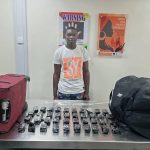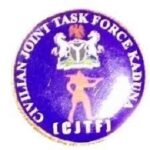Presidential Amnesty Funding: Another Voice, By Ranami Olali

The recent visit of the President of the Ijaw Youth Council (IYC), Sir Jonathan Lokpobiri, to the Interim Administrator of the Presidential Amnesty Programme (PAP), Major-General Barry Ndiomu (rtd), in his Abuja office, has once again indexed the inevitability of sustaining the programme.
Lokpobiri who leads the ever vibrant IYC is a man who should know especially with his influence spreading across the creeks of the oil-rich Niger Delta region. He acknowledged that the relative peace in the region has resulted in sustained crude oil production, with near-zero cases of force majeure. Compare the peace in the creeks today with the upheavals that regularly assailed the region pre-Amnesty years and you will appreciate his submission. Never should Nigeria return to that sour and sore past.
The late President Umaru Yar’Adua had in 2009 created the Amnesty Programme through an implementation committee as a response to the restiveness and febrile ambience of the region at that time leading to intermittent shut down of oil exploration operations and a sharp decline in crude oil output with corresponding drop in petro-dollar accruals. PAP was, therefore, designed to deradicalize the restive youths in the region, train them through various capacity-building initiatives and have them mainstreamed into the larger society. The creation of the programme earned, deservedly, the acclaim and validation of both local and international agencies as a well-thought out initiative that would not only promote and sustain peace but also actively engage and empower the youths of the region.
A comparative analytics of the indices on the relevance and desirability of the programme in the region, before and after its creation, shows that it has achieved monumental success in areas of social welfare, skills acquisition, job and wealth creation, cognitive knowledge impact, entrepreneurship and above all, giving a huge sense of belonging to the region as being an integral part of the national matrix. PAP, therefore, is beyond capacity building and empowerment, it has become an effective tool for national integration. But there is a snag. In recent years, the Niger Delta oil-map has expanded. This also translates to more youths enrolled in the programme and more responsibilities in terms of funding.
This is why the plea of Lokpobiri when he visited Ndiomu recently should not be swept aside. The IYC leader had advocated, pointedly, for increased funding for the programme. He gave his reasons: “With the fast decrease in the value of the Naira, a N65 billion annual funding is a far cry. N65billion of now cannot do what N65 billion of before would have done. It is our appeal to the Government of President Bola Tinubu that there need to be a review.”
He acknowledged that the Programme has been “tremendously successful” in terms of impacting lives of young Niger Deltans and pledged the willingness of the IYC as the umbrella body of young people in the region to partner and work “strategically” with Ndiomu to further reposition the PAP. Lokpobiri’s appeal for increased funding for PAP resonates with the prevailing opinion of a majority of the people of the region. Year after year, PAP’s influence and relevance among the Niger Delta people deepens. And with this comes increased responsibilities all of which exert demand on the purse of the Programme. Aside the mandatory monthly stipend to Amnesty beneficiaries, PAP has been engaged in sundry obligations for the good and peace of the Niger Delta region and for the gain of Nigeria.
In recent years, the PAP has been involved in the sponsorship of series of training in aviation and avionics for some Niger Delta youths among other obligations, including awarding overseas and local scholarships to Niger Deltans, organizing artisanal trainings and blooding the youths in entrepreneurship among other interventions. These responsibilities cost money and put fiscal pressure on the administration of the Programme. The pressure is pumped up with the devaluation of the naira which has made N65 billion look like N20 billion or less. When you factor the reality that the innovative leadership of Ndiomu has helped to capture more people into the PAP net and widened responsibilities to include providing seed capital for groomed entrepreneurs among the youths, you’ll appreciate the enormity of the financial burden on the administrator of the Programme. The bottomline is that there is paucity of funds to keep the programme running and quieten the ex-agitators in the creeks.
The issue of dearth of funds is made worse by the devaluation of the naira. With the current value of the naira, what N65 billion could achieve five years ago or as recent as last year, it cannot achieve same this year. Consider the case of overseas scholarships that require the Programme administrator to change naira to dollars to effect payment of school fees for beneficiaries in offshore schools. Add to that its other fiscal obligations to the people including projects execution in education, general infrastructure, healthcare and welfare, then you will appreciate the suggestion of Lokpobiri.
The reality is that a good 14 plus years after its creation, PAP is now struggling to meet its financial obligations. Ndiomu had at various times hinted at this and has had to resort to massive cost-saving measures to keep the vision afloat. But for how long? The ex-agitators, traditional rulers and other stakeholders have been working assiduously with the Ndiomu leadership to meet the basic needs of the people on a shoestring and still keep the Amnesty flag flying, but such efficiency in austerity does not mean that all is well with the Programme and within the creeks.
President Tinubu as someone with a rich oil and gas private sector background knows that the economic well-being of this nation is still fueled by oil money. The nation’s yearly budget is always benchmarked on the price of crude oil, not on the price of yam, wheat, gold or any other product or produce. It is, therefore, apposite that the federal government must as a necessity do all it can to ensure that Nigeria not meets her OPEC quota but also sustains steady production of crude. This cannot happen in an atmosphere devoid of peace. The Lokpobiri thesis for more funding for PAP appears the most pragmatic way to sustain the momentum and subsequently meet the nation’s OPEC quota.
All over the world, peace is expensive because it is built on the ramparts of development and development costs money. Much more, peace attracts more development. Contrarily, violence is far more expensive because it destroys what was already built and worse still, it attracts zero development. The Tinubu government, now clearly on a momentum of reforms, should take a second look at PAP and its impact on peace and national development. Such impact has been monumental to say the least hence the need not only to apply the Lokpobiri prescription but also to heed the advice of Ndiomu that PAP should be made to transit into a Social Intervention Programme. Ndiomu believes that the sustainable peace being enjoyed in the region is “90 percent” traceable to the various innovative initiatives of the Programme aimed at improving the lives of young people. PAP needs a lifeline to breath well.
- Olali, environmental activist, writes from Port Harcourt








